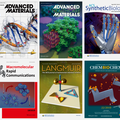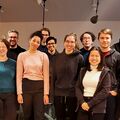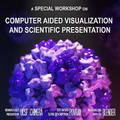Biohybrid Materials
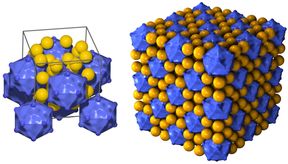
Our research focuses on biohybrid materials, which allow the best features of synthetic and biological material types to be combined. Of special interest are DNA nanostructures, virus particles and other protein cages that can be repurposed for materials science applications. We use advanced nanoparticle, organic and polymer synthesis methods to prepare synthetic building blocks, which are studied in conjunction with biomacromolecules (DNA, proteins, viruses, cellulose). Our goal is to understand the molecular design rules governing their preparation and assembly. The group utilizes high-end characterisation techniques: atomic force microscopy, cryogenic transmission electron microscopy and small angle X-ray scattering to study the systems.
The research topics include:
- Chemical virology
- Protein cages
- Structural DNA nanotechnology
- Life-inspired materials
The group is well-connected nationally as well as internationally. We collaborate extensively with international research groups and have memberships in prestigious national networks e.g.:
Academy of Finland Centre of Excellence in Molecular Engineering of Biosynthetic Hybrid Materials (HYBER, 2014-2019)
Biocentrum Helsinki (2014-2016)
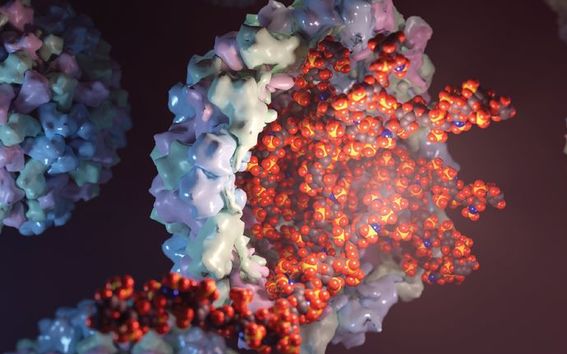
Chemical Virology
Virus particles – the old foes of mankind – can do much more than infect living organisms. Viruses can be thought of as chemically addressable protein particles that can be modified using (bio)chemistry-based techniques. Evolution has rendered viruses with highly controlled self-assembly properties, which can be utilized e.g. in protection and delivery applications.
Our aim is to engineer and repurpose the best features of viruses to benefit biomedical and materials science applications.
See also:
- DNA Origami Directed Virus Capsid Polymorphism, Nature Nanotechnology, 2023, 18, 1205-1212.
- Electrostatic Assembly of Binary Nanoparticle Superlattices Using Protein Cages, Nature Nanotechnology, 2013, 8, 52-56.
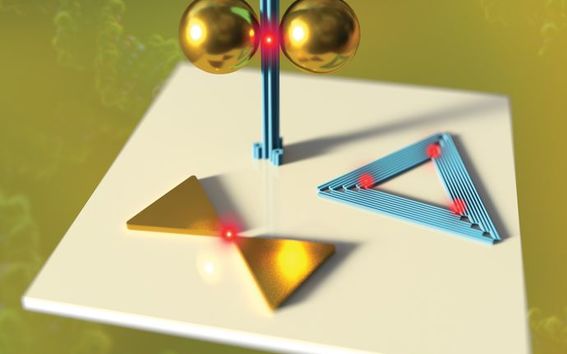
DNA Origami Nanostructures
DNA origami nanostructures are formed by folding a scaffold strand, i.e. a long single-stranded DNA (ssDNA), into desired shape with the help of a predefined set of oligonucleotides. The folding structures can be programmed into arbitrary two and three-dimensional shapes with nanometer scale precision, which opens numerous attractive opportunities to engineer novel functional materials. All the oligonucleotides in the designed structures are unique in sequence and readily available for modification. Therefore, DNA origami can act as a versatile tool for creating active molecular devices as well as directing spatial arrangement of nanomaterials.
We study DNA origamis as platforms for cascade catalysis, preparation of designer metal nanostructures and active reconfigurable materials.
See also:
- Optically Responsive Protein Coating of DNA Origami for Triggered Antigen Targeting, ACS Applied Materials & Interfaces, 2022, 14, 38515-38524.
- DNA Origami Templated Growth of Multilamellar Lipid Assemblies, Angewandte Chemie International Edition, 2021, 60, 827-833.
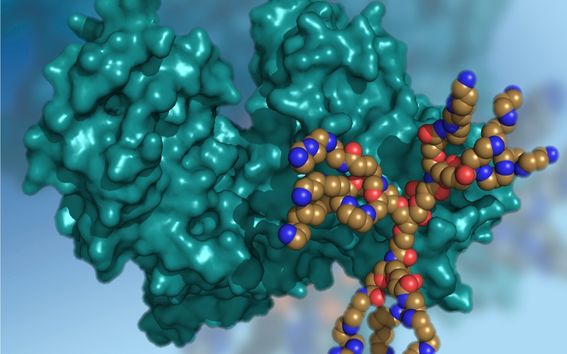
Life-Inspired Materials
The way we make and use materials affects virtually all aspects of our society, such as our health and quality of living. It is anticipated that the future materials production will be influenced by biology in several ways. One way is that we will need to use more biologically derived raw materials to make products in a more sustainable way. Another is that we can draw inspiration from biology for new ways to achieve properties in materials.
We take inspiration to our material studies from life-like properties such as how living structures form, how cells grow, adapt, and how signals are transmitted and stored. This will allow us to give materials new interactive properties and find new ways to make materials in general.
See also:
- Reconfigurable pH-Responsive DNA Origami Lattices, ACS Nano, 2023, 17, 11014–11022.
- Robotic DNA Nanostructures, ACS Synthetic Biology, 2020, 9, 1923-1940.

Open Positions at BiHy:
If you are interested in joining the BiHy team, see further information here
Information about BiHy
Related content:
Nearly 20 million euros for research
The Academy of Finland funding brings nine new posts as Academy Research Fellow, 15 new Postdoctoral Researchers and 24 new Academy Projects to Aalto University.

Three Aalto researchers were elected members of the Finnish Academy of Science and Letters
The Academy invites distinguished academics and scientists to become members.
Professor Mauri Kostiainen, Professor Matti Liski and Adjunct Professor Sabrina Maniscalco from Aalto were elected this year.

Researchers watch anti-cancer drug release from DNA nanostructures in real time
Findings provide insights into tunable drug delivery and new design paradigms of DNA-based drug-carriers
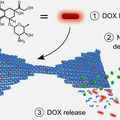
Five new Marie Curie fellows join Aalto
The prestigious research grants supports international researchers to travel abroad to work.

Mauri Kostiainen has received a two million euro grant to study new biohybrid materials
The work of Mauri Kostiainen can help combine the best characteristics of biomolecules and synthetic materials.

Academy Project funding for Professor Mauri Kostiainen
Professor Mauri Kostiainen receives Consortium Project funding from the Academy of Finland

Building miniature optical antennas using DNA as a guide
A new fabrication technique combines programmable DNA origami shapes and conventional lithography methods to create metallic nanoantennas and chiral shapes for diverse applications.
DNA nanostructures get camouflaged by proteins
Straightforward and modular coating strategy can bring programmed DNA origami-based drug-delivery vehicles and nanodevices closer to clinical applications.
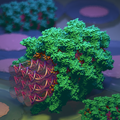
Assembly of nanoparticles proceeds like a zipper
Aalto scientists demonstrated that viruses and nanoparticles can be assembled into processable superlattice wires.
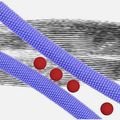
Academy Project funding for two HYBER professors
Professors Robin Ras and Mauri Kostiainen receive Project funding from the Academy of Finland
DNA-based nanodevices for molecular medicine
Self-assembled DNA nanostructures can be used in molecular-scale diagnostics and as smart drug-delivery vehicles.
Assistant Professor Mauri Kostiainen received Young Researcher Award
Kostiainen's work is dynamically new, creative and significant from the perspective of technological development.

WCC Special Recognition granted to Professor Mauri Kostiainen
Professor Mauri Kostiainen was granted the WCC Special Recognition today 17 November.








